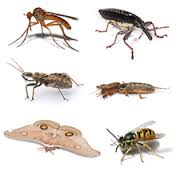记忆方法
将“insect”分解为“in”和“sect”。记住“sect”与“sectarian”(宗派主义者)相似,容易联想到昆虫是分属于一个庞大的生物类群。而“in”可以想象为昆虫藏匿在“in”一个秘密的或隐藏的地方。这样结合起来,可以记住“insect”是指隐藏的、属于一个宗派的生物,即昆虫。
以上内容由AI生成, 仅供参考和借鉴
中文词源
insect 昆虫
in-,进入,使,-sect,切,分,词源同sex,segment.因昆虫分段的躯体而得名。
英语词源
- insect
-
insect: [17] The Greek word for ‘insect’ was éntomon (source of English entomology [18]). It was derived from entémnein ‘cut up’, a compound verb formed from en- ‘in’ and témnein ‘cut’ (a close relative of English tome), and denoted literally ‘creature divided up into segments’. The term was translated literally into Latin as insectum (originally the past participle of insecāre, a compound verb formed from inand secāre ‘cut’), and seems to have been introduced into English in Philemon Holland’s translation of Pliny’s Natural History 1601.
=> section - insect (n.)
- c. 1600, from Latin (animal) insectum "(animal) with a notched or divided body," literally "cut into," from neuter past participle of insectare "to cut into, to cut up," from in- "into" (see in- (2)) + secare "to cut" (see section (n.)). Pliny's loan-translation of Greek entomon "insect" (see entomology), which was Aristotle's term for this class of life, in reference to their "notched" bodies.
First in English in 1601 in Holland's translation of Pliny. Translations of Aristotle's term also form the usual word for "insect" in Welsh (trychfil, from trychu "cut" + mil "animal"), Serbo-Croatian (zareznik, from rezati "cut"), Russian (nasekomoe, from sekat "cut"), etc.
权威例句
- 1. Honeybees use one of the most sophisticated communication systems of any insect.
- 蜜蜂之间所用的交流方式是昆虫中最为复杂的方式之一。
- 2. Many kinds of insect find their mates by scent.
- 许多昆虫通过气味找到交配对象。
- 3. Chambers' voice droned, maddening as an insect around his head.
- 钱伯斯一直在他耳边嗡嗡地说个不停,他都快疯了。
- 4. The insect's wings are almost transparent.
- 这昆虫的翅膀几乎是透明的。
- 5. a species of insect previously unknown to science
- 科学上以前尚未了解的一种昆虫

